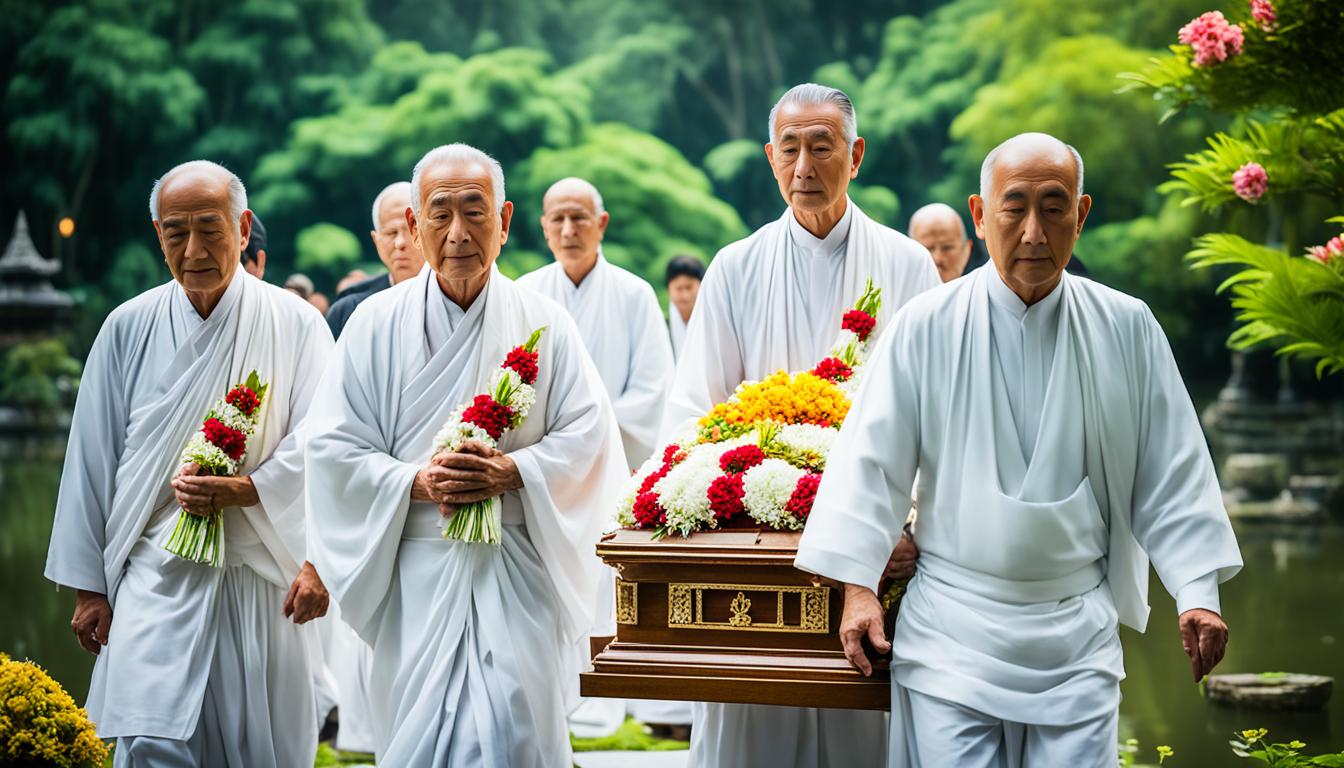Have you ever wondered how Buddhists honor their loved ones who have passed away? What rituals and customs do they follow to pay their respects? Join us on a journey as we explore the graceful world of Buddhist funerals and discover the profound meaning behind their rituals and practices.
Key Takeaways:
- Understand the belief in the cycle of life and reincarnation in Buddhism
- Explore the customs and rituals of Buddhist funerals
- Learn about the proper etiquette when attending a Buddhist funeral
- Discover the significance of the Buddhist mourning period
- Find out how to arrange an authentic Buddhist funeral
The Beliefs and Practices of Buddhism
In Buddhism, there is a core belief in the cycle of life and reincarnation. This belief, known as saṃsāra, plays a significant role in Buddhist funeral customs. Buddhists strive to lead ethical lives and practice meditation and mindfulness to become awakened or enlightened. Good actions and karma are believed to influence one’s reincarnation and move them towards enlightenment after death.
Buddhist funeral customs focus on creating a peaceful environment for the dying, reflecting on the good deeds of the deceased, and performing good deeds on their behalf. Cremation is typically preferred, but burial is also allowed. Buddhist funeral ceremonies often involve monks reciting prayers and sermons, decorating altars with pictures of the deceased, making offerings, and reflecting on the cycle of life.
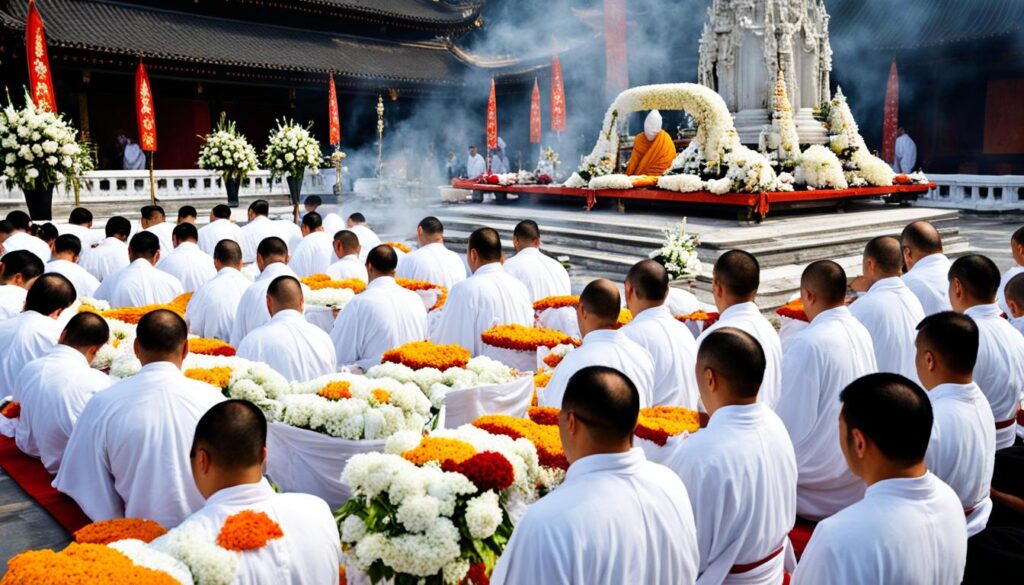
Buddhist Funeral Traditions
Buddhist funeral traditions encompass a range of practices that aim to honor the deceased and support their journey into the next life. Here are some key elements of Buddhist funeral traditions:
- Creating a Peaceful Environment: Buddhist funerals emphasize creating a calm and peaceful environment for the dying and deceased. The location of the funeral often includes serene surroundings, such as a Buddhist temple or a quiet natural setting.
- Reflection on Good Deeds: During a Buddhist funeral, there is a strong focus on reflecting on the good deeds and positive qualities of the deceased. This serves as a reminder of the impact they had on others and encourages mourners to emulate their virtues.
- Performing Good Deeds: Mourners often engage in acts of charity and kindness on behalf of the deceased. These good deeds are believed to benefit the deceased in their journey in the afterlife.
- Monastic Prayers and Sermons: Monks play a central role in Buddhist funeral rituals. They recite prayers, deliver sermons, and offer guidance to the mourners as they navigate the grieving process.
- Altar Decorations and Offerings: Altars are adorned with photographs of the deceased and decorated with flowers, candles, and incense. Mourners make offerings of food, water, and symbolic items to honor and provide for the deceased.
Buddhist Funeral Rituals
Buddhist funeral rituals are deeply rooted in ancient traditions and customs that have been passed down through generations. These rituals provide guidance and comfort during times of loss and grief. Here are some common Buddhist funeral rituals:
- Chanting and Meditation: Chanting of sacred texts and meditation practices are integral parts of Buddhist funeral rituals. They help calm the mind, focus the thoughts on the deceased, and foster a sense of peace and tranquility.
- Reciting Sutras: Sutras are Buddhist scriptures that contain the teachings of Buddha. During a funeral, monks often recite sutras to bless the deceased and guide them on their journey in the afterlife.
- Transfer of Merit: Mourners transfer merit, or the positive energy generated through good deeds and prayer, to the deceased. This act is believed to help the deceased in their afterlife journey and bring them closer to enlightenment.
- Making Offerings to the Sangha: The Sangha refers to the community of Buddhist monks and nuns. Mourners may offer food, robes, or other essential items to support the Sangha as an act of generosity and respect for the Buddhist tradition.
Buddhist Funeral Customs
Buddhist funeral customs vary across different regions and cultures influenced by Buddhism. While the specific practices may differ, several customs are commonly observed:
- Cremation: Cremation is the most common method of disposal for the deceased in Buddhist funeral customs. It symbolizes the impermanence and transience of life, aligning with the Buddhist belief in the cycle of birth, death, and rebirth. However, in some cultures or circumstances, burial may be chosen instead.
- Mourning Period: Buddhists often observe a mourning period following the death of a loved one. This period allows them to reflect, grieve, and honor the deceased. The length and specific customs of the mourning period may vary depending on cultural and regional traditions.
- Funeral Service: Buddhist funeral services usually take place at a temple or a funeral home. They involve various rituals, prayers, and offerings led by monks or other Buddhist clergy. The service provides an opportunity for mourners to gather, pay their respects, and offer support to the bereaved family.
- Post-Funeral Rituals: After the funeral service, there may be additional rituals or ceremonies conducted to support the deceased in their transition. These rituals may involve the scattering of ashes, the placement of ashes in a stupa, or ongoing prayers and offerings at home altars.
| Buddhist Funeral Traditions | Buddhist Funeral Rituals | Buddhist Funeral Customs |
|---|---|---|
| Creating a peaceful environment | Chanting and meditation | Cremation |
| Reflection on good deeds | Reciting sutras | Mourning period |
| Performing good deeds | Transfer of merit | Funeral service |
| Monastic prayers and sermons | Making offerings to the Sangha | Post-funeral rituals |
| Altar decorations and offerings |
Attending a Buddhist Funeral
When you attend a Buddhist funeral, it is crucial to exhibit respect and adhere to specific etiquette. By understanding and following these customs, you can honor the deceased and show support for their loved ones during this solemn occasion.
Etiquette at the Funeral Venue
Upon entering the funeral venue, it is customary to bow at the altar in a prayer position as a sign of respect. This gesture demonstrates your acknowledgment of the significance of the occasion and your willingness to participate in the rituals. It also sets a reverential tone for the rest of the funeral service.
Seating and Participation
During a Buddhist funeral, it is essential to follow the instructions of the monk or person leading the service regarding seating and standing. This ensures a harmonious atmosphere and allows the ceremony to proceed smoothly. Whether you choose to participate in chanting or prefer to sit in silence, both options are completely acceptable. Select the approach that resonates with you and reflects your personal connection with the deceased.
Offerings and Mindset
While it is not mandatory, bringing offerings to the altar or casket is welcomed and considered a compassionate act. These offerings can include flowers, incense, candles, or other symbolic items. They serve as a gesture of remembrance and goodwill towards the departed. It is also recommended to maintain a pure and positive mindset throughout the funeral service. By doing so, you can focus on the enduring love and appreciation for the deceased, cherishing the time spent with them.
Dress Code and Simplicity
When attending a Buddhist funeral, dressing in black or dark-colored simple and modest clothing is appropriate. Buddhist teachings emphasize the impermanence of material possessions, so expensive items and symbols of wealth are not important in this context. By adhering to a humble dress code, you align with the underlying principles of Buddhist philosophy and convey respect for the solemnity of the occasion.
The Buddhist Mourning Period
The Buddhist mourning period is a sacred time of remembrance and transition. Lasting up to 49 days, this period provides an opportunity for family members to offer prayers and support to the departed soul as they embark on their journey into the afterlife. During these 49 days, it is believed that the deceased undergoes a process of purification and preparation for their next life.
In accordance with Buddhist traditions, family members may recite prayers every 7 days for 7 weeks to guide and assist the departed soul along their spiritual path. These prayers serve as a way to honor the person’s memory, provide comfort, and help facilitate their transition to the afterlife. It is a time for reflection, meditation, and deep spiritual connection.
Within the first 100 days after the person’s passing, some Buddhist families choose to refrain from celebratory activities as a mark of respect. Instead, they may opt to perform special prayers and offerings on the 100th day to commemorate the individual’s life and offer blessings for their journey.
During the mourning period, it is common for family members to make daily offerings at the home altar. These offerings, such as food, flowers, and incense, symbolize love, respect, and support for the departed soul. Visiting local Buddhist temples is also a customary practice during this time. The temple provides a serene and sacred space for prayer, meditation, and seeking guidance from the monks, who play a crucial role in assisting the grieving family.
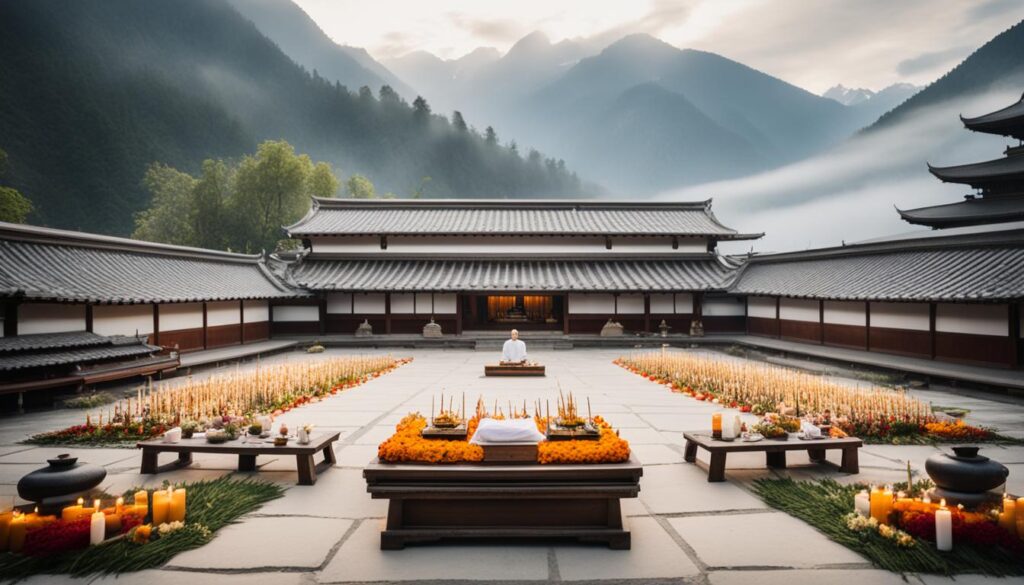
By engaging in these rituals and practices, the family finds solace in the belief that their loved one’s spirit is transitioning and finding peace in the afterlife. The mourning period nurtures a sense of purpose, community, and connection to the spiritual realm, helping both the deceased and the living to find comfort and support during this challenging time.
| Key Practices During the Buddhist Mourning Period |
|---|
| 1. Reciting prayers every 7 days for 7 weeks to guide the departed soul |
| 2. Refraining from celebratory activities during the first 100 days |
| 3. Making daily offerings at the home altar |
| 4. Visiting local Buddhist temples for prayer and guidance |
Arranging a Buddhist Funeral
Planning a Buddhist funeral requires finding a funeral director who is knowledgeable about Buddhist practices and customs. Local temples can provide guidance and recommend funeral directors experienced in Buddhist funerals. Funeral directors with specialized training can adapt their facilities to meet the needs of Buddhist families and create an atmosphere that respects Buddhist traditions.
The ceremony may include meditations, chants, and prayers led by monks, as well as the decoration of altars with images of the deceased and offerings. Families can choose to proceed with cremation immediately after the funeral service, and the ashes can be kept in a stupa or urn.
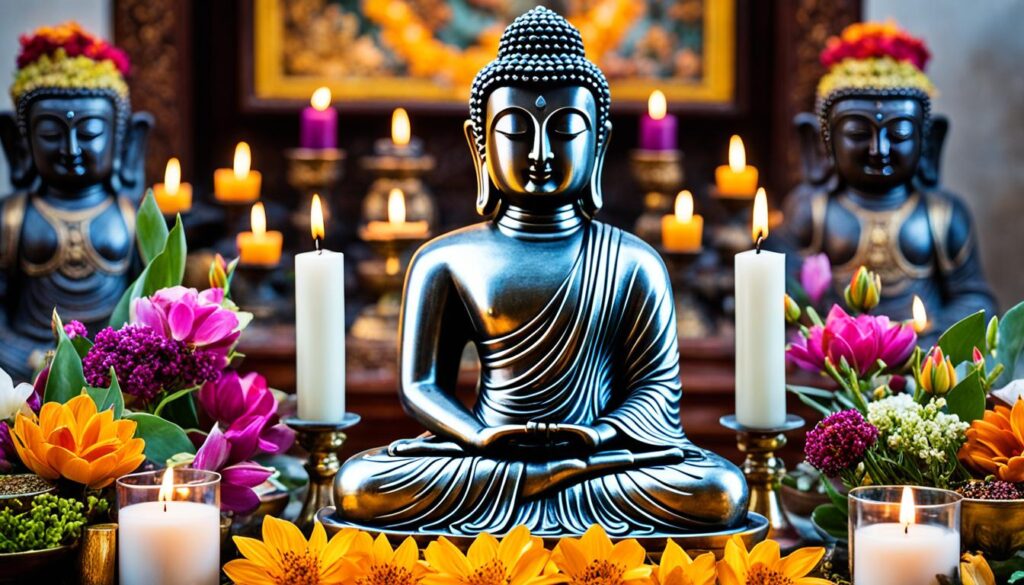
| Arranging a Buddhist Funeral | Benefits |
|---|---|
| Expertise in Buddhist practices and customs | Ensures a respectful and authentic funeral experience |
| Guidance from local temples | Access to resources and recommendations |
| Facilities tailored to Buddhist traditions | Create a serene and sacred environment |
| Incorporation of meditations, chants, and prayers | Deepen spiritual connection and provide comfort |
| Decoration of altars with images and offerings | Honoring the deceased and expressing love |
| Option for immediate cremation | Promptly fulfill Buddhist funeral customs |
The Power of Buddhist Mourning Rituals
Buddhist mourning rituals hold deep significance and offer solace during the grieving process. These ancient traditions provide mourners with a structured and meaningful way to honor their loved ones and find comfort in the face of loss. By engaging in these rituals, individuals can navigate the early stages of grief and maintain a connection with the departed.
One key aspect of Buddhist mourning rituals is making daily offerings. Mourners create altars in their homes and place items such as flowers, candles, and incense as a symbol of remembrance and respect. These offerings signify the continuation of the bond between the living and the deceased and serve as a source of comfort during the grieving period.
Attending temple services is another important part of Buddhist mourning rituals. Mourners gather in temples to participate in prayers, chants, and meditation sessions led by Buddhist monks or nuns. These communal practices provide solace, strengthen one’s connection to the spiritual community, and offer support from others who share a similar journey of loss.
Buddhist mourning rituals emphasize the impermanence of life and the cyclical nature of existence. By actively engaging in rituals that acknowledge life’s transitory nature, mourners find solace, acceptance, and a deeper understanding of the circle of life and death.
The power of these rituals lies in their ability to provide mourners with a sense of purpose during a challenging time. By actively participating in Buddhist mourning practices, individuals are reminded of the interconnectedness of all beings and the eternal spirit that resides within each one of us.
Embedded within these rituals is the belief that the spirit of the departed lives on and is always with us. This belief brings comfort and allows mourners to find peace in the knowledge that their loved ones continue to exist in a different form or realm.
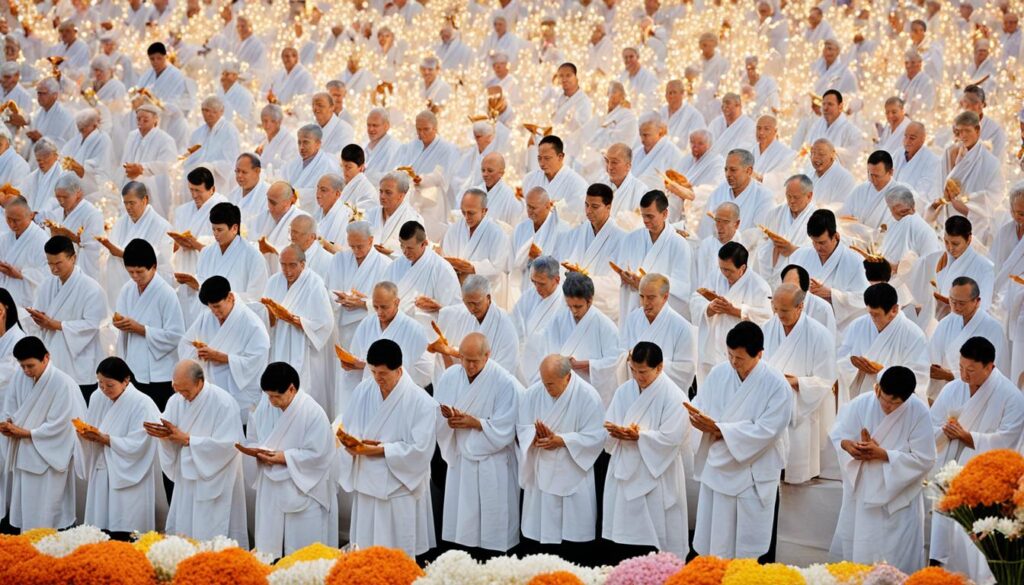
The Cycle of Life and Death
Central to Buddhist mourning rituals is the understanding of the cycle of life and death. Buddhists believe in the concept of reincarnation and view death as a natural transition rather than an end. These rituals help individuals reflect on the impermanence of existence and the inevitability of death. By embracing this acceptance, mourners can find solace and comfort in the knowledge that life continues in different forms.
| Mourning Rituals | Description |
|---|---|
| Offerings at Home Altar | Mourners create altars at home and make daily offerings to honor the deceased. These offerings can include flowers, candles, incense, and personal items. |
| Attending Temple Services | Mourners gather in temples to participate in prayers, chants, and meditation led by Buddhist monks or nuns. These communal rituals provide comfort and support during the grieving process. |
| Reflection on Impermanence | Buddhist mourning rituals encourage contemplation of the impermanence of life and the cyclical nature of existence. This reflection brings acceptance and peace to mourners. |
Creating an Authentic Buddhist Funeral Experience
Berge Pappas Smith is dedicated to providing an authentic Buddhist funeral experience that respects and honors the customs, values, and beliefs of the Buddhist community. With a team of extensively trained staff who possess deep knowledge of Buddhist funeral customs and rituals, Berge Pappas Smith ensures that every aspect of the funeral service is conducted with cultural sensitivity and authenticity.
The facility is thoughtfully designed to meet the specific needs of Buddhist families, offering a culturally respectful environment. Dedicated prayer rooms are available to facilitate spiritual practices and meditation. Carefully arranged seating allows mourners to participate in the funeral rituals comfortably. The presence of traditional Buddhist symbols throughout the facility creates a familiar and comforting atmosphere.
Comparison of Buddhist Funeral Services
| Aspect | Berge Pappas Smith | Competitor A | Competitor B |
|---|---|---|---|
| Staff Knowledge | Extensively trained and knowledgeable about Buddhist funeral customs and rituals | Limited understanding of Buddhist traditions | Some knowledge but not specialized in Buddhist funerals |
| Facility Design | Thoughtfully designed to accommodate the needs of Buddhist families | Standard funeral home with no specific adaptations for Buddhist customs | No dedicated prayer rooms or symbolic elements |
| Cultural Respect | Deep respect and honor for the customs, values, and beliefs of the Buddhist community | May lack cultural sensitivity and understanding | May not fully appreciate the significance of Buddhist traditions |
| Customer Understanding | Attentive and empathetic towards the experiences and needs of Buddhist families | May not fully understand the unique needs and preferences of Buddhist families | May have limited knowledge about Buddhist customs and practices |
Conclusion
Buddhist funerals are a beautiful and meaningful way to honor the life of a loved one. These ceremonies embody the principles of mindfulness, compassion, and respect for all life that are central to Buddhism. By understanding and participating in Buddhist funeral customs, you can show your support and express your love for the deceased.
The belief in the cycle of life and reincarnation provides comfort and the opportunity to reflect on the impermanence of life. Buddhist funeral practices offer insights and wisdom for personal and societal harmony, helping individuals navigate the grieving process and find peace in the face of loss.
Whether you are attending a Buddhist funeral or arranging one, these ceremonies provide a sacred space for healing, remembrance, and spiritual connection. The rituals, prayers, and offerings performed during a Buddhist funeral ceremony create a sense of unity and honor the deceased’s journey to the next life.
In embracing the teachings of Buddhism and the rituals of a Buddhist funeral, you can find solace and meaning as you bid farewell to your loved one. May the mindfulness and compassion inherent in Buddhist funeral customs bring comfort, understanding, and a deep sense of connection during this challenging time.
FAQ
What is Buddhism?
Buddhism is a religion that originated in India over 2,500 years ago. Buddhists follow the teachings of Siddhattha Gotama, also known as Buddha.
What are the beliefs and practices of Buddhism?
Buddhists believe in the cycle of life and reincarnation. They strive to lead ethical lives and practice meditation and mindfulness to become awakened or enlightened.
How can I show respect at a Buddhist funeral?
To show respect at a Buddhist funeral, you can bow at the altar, follow the instructions of the monk or person leading the service, and dress in simple and modest clothing.
How long is the Buddhist mourning period?
The Buddhist mourning period typically lasts up to 49 days, during which family members may recite prayers every 7 days for 7 weeks to help the deceased on their journey into the afterlife.
How do I arrange a Buddhist funeral?
To arrange a Buddhist funeral, it is advisable to find a funeral director who is knowledgeable about Buddhist practices and customs. Local temples can provide guidance and recommend experienced funeral directors.
How do Buddhist mourning rituals help with grief?
Buddhist mourning rituals, such as making daily offerings and attending temple services, offer a sense of purpose and help individuals navigate the early days of grief. They provide comfort and connection to the deceased.
How can I create an authentic Buddhist funeral experience?
To create an authentic Buddhist funeral experience, it is important to find a funeral services provider, like Berge Pappas Smith, who is knowledgeable about Buddhist customs and can accommodate the specific needs of Buddhist families.
What is the purpose of a Buddhist funeral?
The purpose of a Buddhist funeral is to honor the life of the deceased and assist them in their journey to the next life. It is a time for reflection and contemplation on the cycle of life and impermanence.

